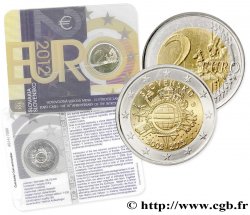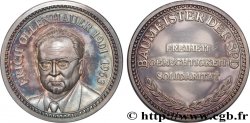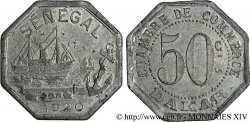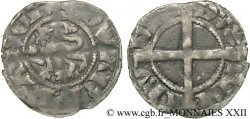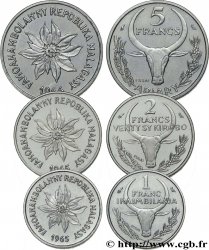Menge
In den Warenkorb

Type : Médaille, Erich Ollenhauer
Datum: n.d.
Name der Münzstätte / Stadt : Allemagne
Metall : Silber
Der Feingehalt beträgt : 999 ‰
Durchmesser : 40 mm
Stempelstellung : 12 h.
Gewicht : 29,99 g.
Rand lisse
Punze : 999
Kommentare zum Erhaltungszustand:
Patine hétérogène, aspect irisé et brillance de frappe. Présence de marques de frottements liées à un nettoyage antérieur notamment au revers, de traces d’oxydation et de quelques rayures. La tranche présente des traces de manipulation
Vorderseite
Titulatur der Vorderseite ERICH OLLENHAUER 1901. 1963.
Beschreibung Vorderseite Portrait de face.
Rückseite
Titulatur der Rückseite BAUMEISTER DER SPD // FREIHEIT / GERECHTIGKEIT / SOLIDARITÄT.
Beschreibung Rückseite Légende semi-circulaire et en 3 lignes avec deux branches de laurier. Titrage: 999.
Übersetzung der Rückseite BÂTISSEURS DU SPD // LIBERTÉ / JUSTICE / SOLIDARITÉ.
Kommentare
Médaille sous capsule.
Erich Ollenhauer fut un homme politique allemand et une figure importante du SPD (Parti social-démocrate d’Allemagne) dans l’après-guerre. Il succéda à Kurt Schumacher à la tête du parti en 1952, après la mort de ce dernier.
Ollenhauer incarna une ligne plus modérée et pragmatique que son prédécesseur. Il poursuivit l’opposition au chancelier Adenauer, en s’opposant notamment à l’intégration militaire de l’Allemagne de l’Ouest dans l’OTAN, et en défendant une politique de neutralité et de réunification pacifique de l’Allemagne. Toutefois, ses propositions manquaient de soutien populaire, et il ne parvint pas à mener le SPD au pouvoir.
Dirigeant respecté mais peu charismatique, Ollenhauer joua surtout un rôle de transition, préparant le terrain pour la modernisation du SPD. Il contribua à rapprocher le parti des réalités de la RFA d'après-guerre, ouvrant la voie à la refonte du programme social-démocrate dans les années 1960, qui culminera avec le Programme de Bad Godesberg en 1959.
Medal in capsule. Erich Ollenhauer was a German politician and a leading figure in the SPD (Social Democratic Party of Germany) in the post-war period. He succeeded Kurt Schumacher as party leader in 1952, after the latter's death. Ollenhauer embodied a more moderate and pragmatic line than his predecessor. He continued to oppose Chancellor Adenauer, notably opposing West Germany's military integration into NATO, and advocating a policy of neutrality and peaceful German reunification. However, his proposals lacked popular support, and he failed to lead the SPD to power. A respected but uncharismatic leader, Ollenhauer primarily played a transitional role, paving the way for the SPD's modernization. He helped bring the party closer to the realities of post-war West Germany, paving the way for the reshaping of the Social Democratic program in the 1960s, culminating in the Bad Godesberg Program in 1959.
Erich Ollenhauer fut un homme politique allemand et une figure importante du SPD (Parti social-démocrate d’Allemagne) dans l’après-guerre. Il succéda à Kurt Schumacher à la tête du parti en 1952, après la mort de ce dernier.
Ollenhauer incarna une ligne plus modérée et pragmatique que son prédécesseur. Il poursuivit l’opposition au chancelier Adenauer, en s’opposant notamment à l’intégration militaire de l’Allemagne de l’Ouest dans l’OTAN, et en défendant une politique de neutralité et de réunification pacifique de l’Allemagne. Toutefois, ses propositions manquaient de soutien populaire, et il ne parvint pas à mener le SPD au pouvoir.
Dirigeant respecté mais peu charismatique, Ollenhauer joua surtout un rôle de transition, préparant le terrain pour la modernisation du SPD. Il contribua à rapprocher le parti des réalités de la RFA d'après-guerre, ouvrant la voie à la refonte du programme social-démocrate dans les années 1960, qui culminera avec le Programme de Bad Godesberg en 1959.
Medal in capsule. Erich Ollenhauer was a German politician and a leading figure in the SPD (Social Democratic Party of Germany) in the post-war period. He succeeded Kurt Schumacher as party leader in 1952, after the latter's death. Ollenhauer embodied a more moderate and pragmatic line than his predecessor. He continued to oppose Chancellor Adenauer, notably opposing West Germany's military integration into NATO, and advocating a policy of neutrality and peaceful German reunification. However, his proposals lacked popular support, and he failed to lead the SPD to power. A respected but uncharismatic leader, Ollenhauer primarily played a transitional role, paving the way for the SPD's modernization. He helped bring the party closer to the realities of post-war West Germany, paving the way for the reshaping of the Social Democratic program in the 1960s, culminating in the Bad Godesberg Program in 1959.








 Berichten über einen Fehler
Berichten über einen Fehler Die Seite drucken
Die Seite drucken Teilen meiner Auswahl
Teilen meiner Auswahl Stellen Sie eine Frage
Stellen Sie eine Frage Einlieferung/Verkauf
Einlieferung/Verkauf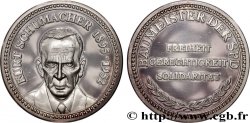
 Details
Details




